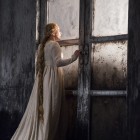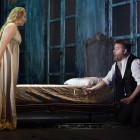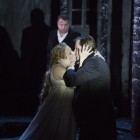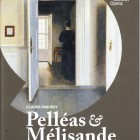Pelléas and Mélisande 2017Scottish Opera
Read more about the opera Pelléas et Mélisande
The return of a great opera
Scottish Opera's 2016/17 mainstage season includes a new staging of Pelléas et Mélisande, which the company has not mounted in forty years. This marks a most welcome return. Pelléas played an important role in the early years of Scottish Opera, being one of the pair of operas that launched the company's operations in 1962.
To commemorate the tenth anniversary of that event the company mounted a new staging by Colin Graham. This 1972 interpretation was highly praised, and was performed repeatedly until 1979, with David Pountney among the young directors who worked on it. Pelléas featured in the company's first visit to London and was seen at the Edinburgh Festival. It was a memorably haunting interpretation that seemed to bring out the best from all the singers who appeared in it.
Since then, Scotland has seen an excellent, but completely different, Festival staging by the Opéra de Lyon under John Eliot Gardiner and a concert performance by the RSNO under Stéphane Denève. A second Festival staging imported from Germany was less successful. It was therefore high time for the company to mount its third production. The opera is notoriously difficult to bring off - not easy to find singers who can convincingly enter the strange musical world, if anything even more difficult to find a director and designer who can produce a convincing visual setting. In placing the staging in the hands of that most astute and penetrating of directors Sir David McVicar, with his designer Rae Smith, Scottish Opera have scored an undoubted bull's eye.
Visual impact
The visual influences are drawn from the time of composition - Vilhelm Hammershøi, or in a more familiar context perhaps, Whistler. While Pelléas is hardly the Ibsenite drama this might imply, the framework fits it well. The costumes were stylishly redolent of that fin-de-siècle period, including waistcoats and frock coats for the men, with Yniold in a sailor suit. There was sustained effort at setting a context - this particular dysfunctional family usually performs in a vacuum, but here were servants running the household, and the family even sat down to dinner.
McVicar tackles the notorious difficulties head on, with an unaccustomed amount of detail in his stage directions - Mélisande's copious volumes of hair are used to great effect in the balcony scene. Projections hint at dappled water, or the flight of doves. The lighting was cool and clear, though less effectively varied after the interval. The use of blackout curtains was effective when illustrating the short scenes, down in the dungeons or coming up for air.
Glorious sound world
This opera demands a special level of performance from the orchestra. Stuart Stratford has shown a great affinity with that period of operatic work, and the sounds coming from the pit were simply glorious, with everything beautifully paced.
The cast looked good on paper and was hard to fault in the event. Carolyn Sampson showed in the last McVicar production, The Rake's Progress, that she is not just a baroque expert, but extremely versatile, and her French was also highly communicative. Roland Wood had a lighter voice than is often used for Golaud nowadays, but it came over powerfully with a fine sense of attack. So often when a powerful Wagnerian bass-baritone is heard in the part it can be difficult to distinguish his voice from that of Arkel and even the doctor in the last act. Here, if there was an issue it came from the other end of the vocal range as we had a full-toned baritone Pelléas rather than a tenor or bariton-martin with its lighter sound. However Andrei Bondarenko was in all other respects a fine interpreter of a part that is difficult to define.
Anne Mason has worked with the company regularly throughout her career and always provides interpretations of quality. Geneviève only appears in a couple of scenes, though here she was seen briefly in the final act. As always she created a fully-rounded character with minimum fuss. Alastair Miles has never worked with Scottish Opera before, indeed had rarely been seen on stage here at all until his recent Claggart in Opera North's Billy Budd. His appearance as Arkel was welcome, and he projected sympathy while not making the old man seem completely ineffectual - and he sang beautifully.
It is relatively unusual to have the child Yniold played by a treble instead of the normal boyish-looking soprano. At the second performance Thomas John, one of two London-based choirboys sharing the role, gave an assured performance, only a couple of times being swamped by the orchestra. Already with Covent Garden experience he proved an excellent actor in the disturbing scene when he is forced to act as a spy.
The production went on to win the UK Theatre Award 2017 for Achievement in Opera, and was also shortlisted for a Royal Philharmonic Society Music Award. It was later nominated for the South Bank Sky Award for Opera.
Performance Cast
- Golaud
- Mélisande
- Geneviève mother of Golaud and Pelléas
- Arkel King of Allemonde, grandfather of Golaud and Pelléas
- Pelléas Golaud’s half-brother
- Yniold son of Golaud
-
Cedric Amamoo (Feb 23; Mar 1, 4, 11)
Thomas John (Feb 26; Mar 7, 9)
- Doctor






